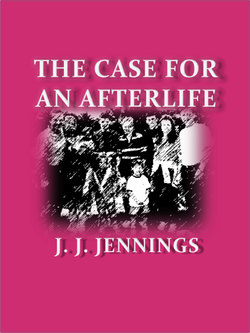Читать книгу The Case for an Afterlife - J. J. Jennings - Страница 10
На сайте Литреса книга снята с продажи.
Chapter 7. “Credible Evidence” Criteria for “Medium Sessions”
ОглавлениеWhat do the skeptics say about “medium sessions?”
Apparently, most skeptics are among the 55% of us who don’t believe a medium can communicate mentally with the dead – at least, that’s what their comments suggest. Here’s a representative set of those comments: (20) (21) (22) (23)
1.In some cases, the medium or an associate wanders among audience members before a scheduled performance and listens for information that can be used on stage as part of the readings. This practice is part of a technique known as “hot reading”.
2.Often the medium employs “warm reading” techniques – uses principles of psychology that apply to almost everyone. For example, knowing that many grieving people will be wearing pieces of jewelry from their departed loved ones, the medium claims to be receiving a message that “a piece of jewelry belonging to the deceased is being worn here tonight”.
3.Many times, mediums use “cold reading” techniques, such as “fishing for details”. For example, the medium says “the deceased is telling me something about January” – and the client is expected to agree or disagree. If the client says “I was born in January, the medium says “Yes, I see that”, and then continues with “another piece of bait”. If the client says “I can’t think of anything”, the medium says “I’m sure of it, but perhaps you’re suppressing a painful memory”, or “I’m sorry, that message is from another spirit who wants to be heard”. Here is another “cold reading” example: The medium says “I’m sensing that the deceased had a pain – around the heart”, and the client either answers something like, “He died of a heart attack”, or “I don’t know anything about a pain around the heart”. Given the latter response, the medium replies “He’s telling me he didn’t want anyone to worry, so he kept it to himself”, or “He’s telling me he had a secret romance that didn’t turn out very well when he was a young man”.
4.In almost every case, the client wants the medium to succeed in communicating with a departed loved one, so the client works very hard to find personal meaning in whatever the medium offers. This is known as “subjective validation” – the client validates words, initials, dates, or symbols as accurate because he or she wishes to find personal meaning and significance in them. Note that this is an issue whether or not the medium communicates directly with the client. Even in those cases where the medium does not ask questions directly of, nor receives answers directly from, the client, the medium’s message is likely to be subjectively validated by the client.
5.Most clients also exhibit “selective thinking” or “selective memory” – in other words, they retain the favorable evidence from the medium’s reading, and ignore or forget the unfavorable evidence from the reading.
6.If the medium does receive specific information about the deceased, it’s not necessarily from the deceased – it could be that the medium is telepathically receiving that information from the client.
Given these skeptical comments, and given that the majority of us do not believe in mental communication with the dead, finding credible “medium sessions” is likely to be difficult. Let’s establish our criteria for the search, using the skeptical comments as a basis.
What are the criteria we’re using in our search for credible “medium sessions”?
The first five of our criteria are matched to the skeptical comments listed above:
1.The medium and the medium’s associates are to have no contact with the client prior to the session (Matched to skeptical comment 1).
2.Any non-specific information presumably being supplied by the deceased through the medium is not to be considered credible evidence (Matched to skeptical comments 2, 3, 4, and 5).
3.During the session, the medium and the medium’s associates are not to see or hear the client, nor are they to ask questions of the client (Matched to skeptical comment 3).
4.To be considered accurate and credible, the medium’s reading must contain information that in combination is very specific to the deceased – information such as the deceased’s name, a pet phrase or remark, a distinguishing physical characteristic, the cause of death, a life event known only by the deceased and close loved ones, etc. (Matched to skeptical comments 4 and 5).
5.The client must not be anywhere near the medium before or during the medium’s reading (Matched to skeptical comment 6).
In addition to these five criteria matched to the skeptics’ comments, we are adding a sixth criterion of our own:
6.Some of the specific information about the deceased that is provided by the medium must be transcribed to enable validation by individuals other than the client.
In Chapter 8, we apply the six criteria listed above to evaluate which medium sessions in the published material are to be considered “credible evidence” of an afterlife – assuming there are any to be considered credible, of course.
*****
